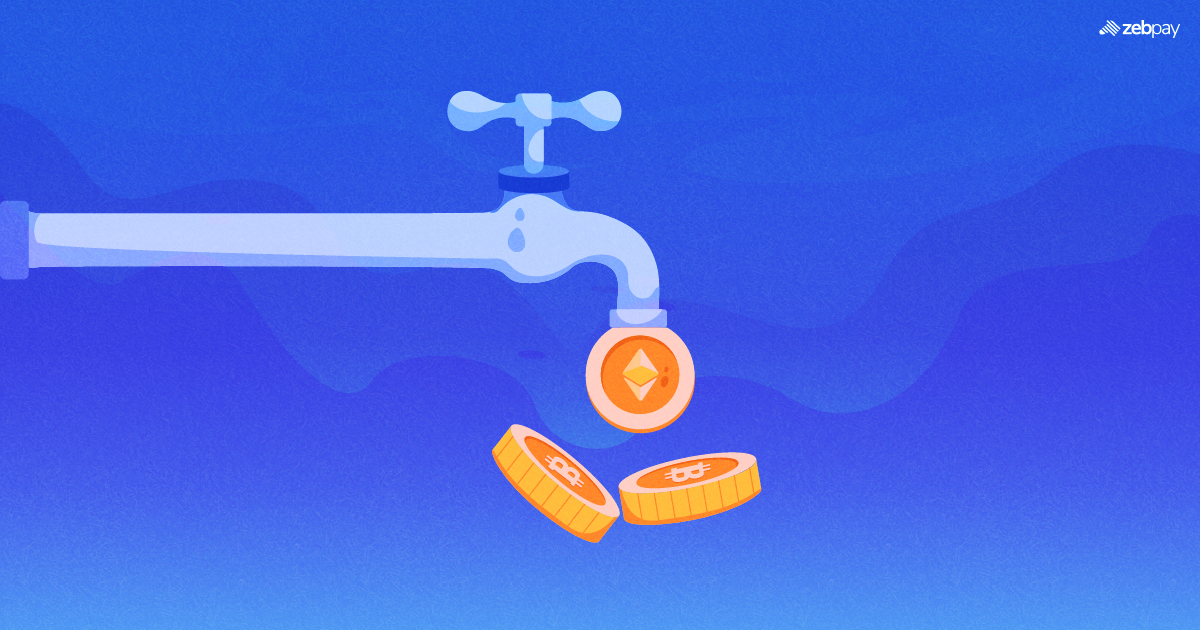A crypto coin faucet is a platform that lets users earn small amounts of cryptocurrency by completing simple tasks, such as solving captchas, viewing ads, or engaging with basic content. The idea behind a faucet in crypto comes from the analogy that just as individual drops of water from a dripping tap can eventually fill a container, small crypto rewards can add up over time. Today, users can find various options ranging from Bitcoin (BTC) and Ethereum (ETH) to BNB and other tokens, with many platforms positioning themselves as a free crypto faucet for beginners.
The concept dates back to 2010, when Gavin Andresen—then the lead developer of the Bitcoin network—launched one of the earliest Bitcoin faucets. This initiative rewarded users with 5 BTC for completing a simple captcha, distributing a total of 19,715 BTC over time. The faucet played a key role in spreading early Bitcoin ownership and educating users about how the network worked. While such large payouts are no longer feasible due to today’s market valuations, modern projects still use faucets as a user-acquisition and learning tool. Many emerging platforms now compete to be among the best crypto faucets, targeting users who want to explore crypto with minimal risk. This blog explores what crypto faucets are, how they work, the different types available today, and the potential risks users should be aware of before participating.
Origin and Evolution of Crypto Faucets
The concept of a faucet in crypto dates back to the early days of blockchain adoption, when awareness and user participation were extremely limited. To encourage experimentation and understanding, early developers introduced the idea of distributing small amounts of cryptocurrency for free, allowing users to interact with the technology without financial risk. This laid the foundation for what would later be known as the crypto coin faucet.
One of the most notable milestones in this evolution occurred in 2010, when Gavin Andresen launched the first widely recognised Bitcoin faucet. At the time, users could earn several bitcoins simply by completing basic tasks like solving a captcha. This free crypto faucet played a crucial role in spreading early Bitcoin ownership, educating users on wallet usage, and helping the network gain initial traction.
As cryptocurrency prices rose and the ecosystem matured, faucets evolved in both structure and purpose. Large giveaways became unsustainable, leading to smaller, task-based rewards and diversified earning mechanisms. Today, faucets support multiple blockchains and tokens, and many platforms position themselves among the best crypto faucets by offering improved user experiences, broader asset options, and integrated learning tools. From simple Bitcoin distributions to multi-asset platforms, crypto faucets have transformed into adoption-driven tools that continue to support education and engagement within the blockchain ecosystem.
Also Read: Crypto SIPs: A Guide to Crypto Investments!
Defining Crypto Faucets
A crypto faucet refers to a website or application that grants registered users small amounts of crypto as a reward for completing uncomplicated tasks, such as viewing an advertisement or participating in a brief survey. Essentially, crypto faucets serve as a marketing strategy employed by crypto platform owners to introduce newcomers to a specific digital asset.
It’s important to note that crypto faucets are not a quick means to accumulate wealth. The simplicity of the task correlates with a lower reward, and most websites set a minimum payout threshold. Rewards earned for task completion are typically stored in an online wallet on the site, and users can withdraw these rewards only after reaching the predetermined minimum threshold. While some of the best crypto faucets might enable users to achieve this in just a day, it often takes longer, sometimes exceeding a week.
The purpose of a crypto faucet lies in the context of the evolving nature of crypto. Despite its significant growth in recent times, crypto remains unfamiliar to many people globally. The core idea behind crypto faucets is to distribute free crypto to individuals, encouraging them to invest time in learning about digital assets with the hope that they will consider making investments in the future.
Purpose of Crypto Faucets in the Blockchain Ecosystem
The primary purpose of a faucet in crypto is to introduce new users to blockchain networks in a low-risk and accessible way. By distributing small amounts of digital assets, a crypto coin faucet allows users to experience how cryptocurrencies work—right from receiving tokens to using wallets and making transactions—without needing an upfront investment. This hands-on exposure plays a key role in onboarding beginners into the crypto ecosystem.
Another important role of free crypto faucets is education. Faucets encourage users to learn basic blockchain concepts such as public addresses, transaction confirmations, and network fees. For many first-time users, interacting with a faucet is their initial step toward understanding how decentralised systems function in real-world scenarios.
From a network perspective, crypto faucets help drive adoption and user engagement, especially for new or emerging blockchain projects. By incentivising participation, projects can grow their user base, test network activity, and create awareness around their tokens. This is why many platforms compete to be among the best crypto faucets, offering user-friendly interfaces and consistent rewards to attract and retain users.
Overall, the purpose of crypto faucets extends beyond free rewards. They act as educational tools, adoption catalysts, and community-building mechanisms that support the broader growth and accessibility of the blockchain ecosystem.
How Crypto Faucets Work
To engage with a crypto faucet, participants initially need to register and complete a swift and straightforward task, such as solving a captcha, clicking on an ad, watching a brief video, or playing a short video game. After completing the task, users can claim their reward, which is typically credited to their newly created account on the faucet platform. Some faucets may impose a small transaction fee for withdrawals. In the early stages, there were limited options for spending digital currency, but nowadays, numerous vendors accept Bitcoin and various altcoins.
While it’s accurate that faucets offer users a method to earn modest amounts of free crypto, it’s crucial to approach them cautiously. Presently, faucet earnings are generally minimal, and there can be elevated cybersecurity risks associated with their use.
Types of Crypto Faucets

Bitcoin pioneered the concept of coin faucets, gaining widespread popularity and inspiring other digital assets to follow suit. A Bitcoin faucet is essentially a reward system that provides small amounts of Bitcoin, known as Satoshi (the one-millionth unit of 1 Bitcoin, equal to 0.00000001 BTC). In exchange for solving captchas, clicking links, or completing other simple tasks, users receive Satoshis. The quantity of free Bitcoin offered by a faucet varies, with some sites featuring generous rates and others not.
The inception of free Bitcoin faucets also stemmed from the limited availability of exchanges in the early days of crypto, when acquiring Bitcoin was challenging due to a lack of exchanges. Providing free Bitcoins served as a compelling incentive to spark interest in Bitcoin and promote its adoption without requiring individuals to invest capital.
Similarly, Ethereum faucets operate on a comparable principle to Bitcoin faucets, but instead of Satoshis, they reward users with Ether for undertaking various tasks. This approach serves as an effective means for users to earn free Ethereum tokens by participating in advertising and data mining.
Other examples of crypto faucets include Litecoin (LTC) and Monero (XMR) faucets. For instance, MoonLitecoin provides users with free LTC for completing diverse activities, such as streaming videos.
Also Read: 10 Best Cryptos to Buy Under $1 in 2026
How Crypto Faucets Help Onboard New Crypto Users
Crypto faucets play a key role in onboarding first-time users by lowering the entry barrier to blockchain participation. A faucet in crypto allows users to receive small amounts of digital assets without making an initial investment, helping them understand wallets, transactions, and basic blockchain mechanics. By interacting with a crypto coin faucet, beginners gain hands-on experience, which builds confidence and familiarity with the ecosystem.
What Tasks Do Users Perform on Crypto Faucets?
Most free crypto faucets reward users for completing simple, low-effort tasks. These commonly include solving captchas, viewing advertisements, answering basic quizzes, or engaging with project-related content. Some of the best crypto faucets also include educational tasks, such as learning about a token or testing basic blockchain features, making the experience both informative and practical.
Faucet Wallets and Withdrawals
The functioning of a crypto faucet is straightforward—simply register with a digital asset service or visit a crypto faucet website or app, where you can earn free crypto by engaging in activities like playing games, participating in surveys, and watching videos or ads. The crypto you earn is then transferred to your crypto wallet by the faucet’s website or app.
A micro wallet, akin to standard wallets but designed for holding smaller amounts of crypto, is typically created when you sign up for a crypto faucet. Mini-wallets offer advantages such as exemption from transaction fees and organized information. However, you can’t withdraw funds until this micro wallet accumulates a minimum level of rewards. At that point, all the crypto is automatically transferred to your primary crypto wallet. It’s essential to be aware that certain websites may impose a time limit on claiming rewards. Additionally, if you frequently use a faucet, the rewards may increase over time, reaching more substantial amounts.
How Rewards Are Distributed Through Crypto Faucets
Rewards from a crypto coin faucet are usually distributed in small fractions of cryptocurrency to ensure sustainability. Depending on the platform, rewards may be credited instantly or accumulated until a minimum withdrawal threshold is reached. Many faucet in crypto models rely on ad revenue or project funding to support these payouts while maintaining regular reward cycles.
Benefits of Using Crypto Faucets for Beginners
For beginners, crypto faucets offer a risk-free way to explore digital assets. They help users learn wallet management, understand transaction flows, and interact with blockchain networks without spending money. Using the best crypto faucets can also introduce users to multiple cryptocurrencies, encouraging gradual learning and experimentation.
Limitations of Crypto Faucets and Earning Potential
While crypto faucets are useful for learning, their earning potential is limited. Rewards are intentionally small and should not be viewed as a primary income source. Over time, users may also encounter withdrawal limits, time restrictions, or reduced payouts, especially on free crypto faucets with high user activity.
Also Read: 4 Ways to Calculate Profit and Loss of Your Crypto Portfolio
Common Cryptocurrencies Supported by Crypto Faucets
Crypto faucets typically support well-known cryptocurrencies such as Bitcoin (BTC), Ethereum (ETH), and BNB. In addition, many free crypto faucets focus on newer or emerging tokens to promote awareness and adoption. This variety allows users to explore different blockchains while learning how multi-asset wallets and networks function.
How to Identify Legitimate Crypto Faucets
Identifying a trustworthy crypto coin faucet requires careful evaluation. Legitimate platforms are transparent about reward structures, withdrawal rules, and supported networks. The best crypto faucets typically have clear terms, verifiable user reviews, and do not demand excessive personal information or upfront payments.
Security and Privacy Best Practices When Using Crypto Faucets
When using a faucet in crypto, security and privacy should be top priorities. Users should avoid sharing private keys, use dedicated wallets for faucet earnings, and enable basic security features wherever possible. It’s also wise to be cautious of free crypto faucets that request unnecessary permissions or personal data.
Are Crypto Faucets Worth Using Today?
Crypto faucets are still relevant today, particularly for users who want to learn without financial risk. While they may not offer significant earnings, they remain effective educational and onboarding tools. For beginners, the best crypto faucets provide valuable exposure to blockchain fundamentals in a practical setting.
Key Things to Know Before Using a Crypto Faucet
Before engaging with a crypto coin faucet, users should understand that rewards are small, time-based, and often subject to withdrawal limits. It’s important to manage expectations, prioritise security, and view faucets as learning tools rather than profit-generating platforms. With the right approach, a faucet in crypto can be a useful starting point in the broader blockchain journey.
Conclusion
Crypto faucets allow users to earn small amounts of cryptocurrency at no cost, but building meaningful rewards typically requires consistent participation and a significant time commitment. While the earnings may be limited, interacting with a faucet in crypto remains a useful way to learn how blockchain networks, wallets, and transactions function in practice. For this reason, many users view a crypto coin faucet as an educational tool rather than a primary income source.
That said, some traders still use free crypto faucets as a supplementary way to earn passive rewards over time, especially when engaging with platforms considered among the best crypto faucets. However, it is essential to conduct thorough research before participating and to prioritise digital safety, as not every crypto faucet platform operates with the same level of transparency or security.
Just like pineapple on pizza, ZebPay blogs offer a unique twist on crypto insights. Learn more and start your journey with millions on ZebPay!
FAQs about Crypto Faucets
What is a crypto faucet and how does it work?
A crypto faucet is a platform that rewards users with small amounts of cryptocurrency for completing simple tasks such as solving captchas, viewing ads, or engaging with basic content. The idea behind a faucet in crypto is to help users experience how blockchain transactions work without needing to invest money upfront. Rewards are usually credited to an internal faucet wallet and can be withdrawn once a minimum threshold is reached.
Are crypto faucets safe to use for beginners?
Crypto faucets can be safe for beginners if used carefully. Reputable platforms do not ask for private keys or upfront payments. However, users should remain cautious, use a separate wallet for faucet earnings, and avoid platforms that request excessive personal information. Sticking to well-reviewed and established faucets reduces potential risks.
Can you really earn cryptocurrency from faucets?
Yes, it is possible to earn cryptocurrency from a crypto coin faucet, but the rewards are typically very small. Faucets are designed for learning and onboarding rather than generating substantial income. Over time, consistent participation can help users accumulate small amounts of crypto while gaining hands-on experience.
Which cryptocurrencies are commonly offered by crypto faucets?
Most crypto faucets support popular cryptocurrencies such as Bitcoin (BTC), Ethereum (ETH), and BNB. Many free crypto faucets also distribute emerging or lesser-known tokens to promote new blockchain projects and encourage adoption.
How much can you earn from a crypto faucet?
Earnings from a faucet in crypto are limited and depend on factors like task frequency, platform rules, and user activity. In most cases, rewards are only fractions of a cryptocurrency and should not be viewed as a reliable income source. The primary value lies in learning and experimentation.
Do crypto faucets require any financial investment?
No, crypto faucets do not require any financial investment. Users can participate and earn rewards without depositing money, which is why free crypto faucets are often recommended for beginners who want to explore crypto without financial risk.
What are the risks associated with using crypto faucets?
The main risks include exposure to scams, misleading platforms, and privacy concerns. Some crypto coin faucet platforms may display intrusive ads or attempt to collect unnecessary data. Conducting proper research and following basic security practices can help minimise these risks.
How do faucet wallets and withdrawals work?
Most crypto faucets use an internal wallet system where rewards are accumulated over time. Once users reach a predefined withdrawal limit, funds can be transferred to a personal crypto wallet. Withdrawal times and fees vary depending on the platform and the blockchain network used.
Are crypto faucets still relevant in today’s crypto ecosystem?
Yes, crypto faucets remain relevant, especially for education and user onboarding. While they are no longer a means of earning large rewards, they continue to serve as a practical entry point for beginners looking to understand blockchain basics and explore the crypto ecosystem safely.







